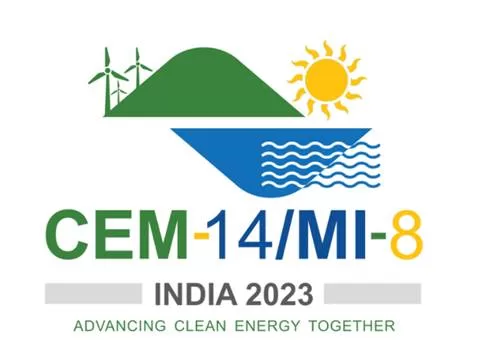
The 4th Energy Transitions Working Group Meeting under India’s G20 Presidency will be held in Goa during July 19 – 20, 2023. This will be followed by the G20 Energy Ministerial meeting on July 22, 2023, which would be held under the chairpersonship of Union Minister for Power and New and Renewable Energy, Shri R. K. Singh.
On the margins of the G20 Energy Transitions Ministerial and Working Group Meetings, the 14th Clean Energy Ministerial (CEM) and 8th Mission Innovation (MI) meeting (CEM14/MI-8) will also be held in Goa during 19th to 21st of July, 2023, . The CEM / MI Ministerial Meeting would be held on 21st July, 2023, under the chairpersonship of Union Minister for Power and New and Renewable Energy, Shri R. K. Singh. Union Minister for Science and Technology Dr. Jitendra Singh will be the vice-chair of the CEM/MI meeting.
The G20 Ministerial meeting will be followed by the launch of the Green Hydrogen Innovation Centre by the Union Minister for Power and New and Renewable Energy Shri R. K. Singh and the Global Biofuel Alliance by Union Minister for Petroleum and Natural Gas Shri Hardeep Singh Puri, both on 22nd July, 2023.
Addressing a press conference in New Delhi today, Shri Pankaj Agrawal, Secretary, Ministry of Power, informed that the Energy Ministers from G20 member countries, 9 invited countries and high-ranking officials from 14 international organizations will be part of the Ministerial meeting. More than 1,000 participants including policymakers, delegates, invitees, business leaders, and researchers are expected to attend various meetings and events across these four days.
The Power Secretary said that on the sidelines of G20 meetings, the Union Minister for Power and New & Renewable Energy will also hold bilateral meetings with the European Union and seven countries namely Japan, Singapore, South Korea, USA, Germany, France and Australia. The thrust of these bilateral meetings would be on establishing common certification, regulation and standards for Green Hydrogen besides promoting its export from India. Shri Agrawal also informed that as part of the Global Biofuel Alliance, Brazil, India, and the United States, as leading biofuel producers and consumers, will work together during the next few months towards the development of a Global Biofuels Alliance along with other interested countries.
India, under its G20 Presidency, had identified six priority areas for the Energy Transitions Working Group. These are: (i) Energy Transitions through addressing technology gaps (ii) Low-cost financing for energy transitions (iii) Energy security and diversified supply chains (iv) Energy efficiency, industrial low-carbon transitions, and responsible consumption (v) Fuels for Future and (vi) Universal access to clean energy and just, affordable, and inclusive energy transition pathways.
The Power Secretary said that the discussions and deliberations in Goa will continue to build on the first three meetings in Bengaluru, Gandhinagar, and Mumbai, to identify and promote best practices, policies, and innovative approaches that support a just and inclusive energy transition. The objective is to develop a collective roadmap for achieving sustainable and equitable growth while addressing the challenges associated with energy transition effectively.
On the sidelines of ETWG, the Meeting will be complemented by various side events – ‘Enabling policies to accelerate e-mobility, ‘Promoting solar energy for universal energy access’, ‘Decentralized renewable energy applications for achieving SDG 7 goals’, ‘Drive for advancing knowledge and solutions through aggregation in energy efficiency’, and ‘Powering progress in Global South – Accessible and Affordable Clean Energy for all.’
The 14th edition of CEM is simultaneously being organised by the Bureau of Energy Efficiency (BEE), under the Ministry of Power, and the Department of Science and Technology, Ministry of Science and Technology. The theme of CEM14/MI-8 is ‘Advancing Clean Energy Together.’
The theme for CEM-14 / MI-8 is “Advancing Clean Energy Together”. This year’s Clean Energy Ministerial (CEM) and Mission Innovation (MI) meetings will bring together governments, international organizations, private sector, academia, innovators, civil society, early career researchers and policymakers over a four-day program featuring high-level ministerial dialogues, global initiative launches, award announcements, minister-CEO roundtables and a wide array of side-events cutting across diverse themes of clean energy transition. CEM14 / MI8 will also feature a public-facing technology showcase demonstrating cutting-edge advances in clean energy from India and around the world. The Ministerial plenaries are scheduled for July 21, 2023, while back-to-back G20 Energy Transition Ministerial Meeting will be held on July 22.
CEM14 / MI-8 to Feature More than 80 Side Events on a Range of Clean Energy Topics
Under the theme of ” Advancing Clean Energy Together”, high-level roundtables, side-events and technology showcases would enable stakeholders to accelerate the deployment of clean energy by encouraging development of policies and programmes which advance clean energy technology and solutions around the world.
The Clean Energy Ministerial / Mission Innovation meeting will have more than 80 side events, focusing on a range of clean energy topics, such as industry decarbonisation, clean energy marine hubs, battery storage, access to energy (open), roundtable on green hydrogen, sustainable cooling, energy deployment and meeting the innovation needs for energy transition, current program, and future course of action.
Eight roundtables and high-level dialogues are scheduled following the Ministerial Plenary. These will provide B2B engagement opportunities, government-industry discussions and policy dialogues. Top business and energy leaders from across the world are expected to be part of these meetings.
The full list of side events and other engagements can be found in the programme agenda, which can be accessed here.
CEM14 / MI-8 Technology Showcase to feature New and Emerging Technologies
Under the aegis of CEM14/MI-8, a Technology and Cultural showcase is being organised at the Shyama Prasad Mukherjee Indoor Stadium in Goa from Jul. 19th-22nd, 2023. The Technology Showcase will feature new and emerging technologies like Electric Vehicles, Hydrogen, and other clean technologies from across the world. Technology showcase will be organized under three parts, namely, Vehicle and Charging Infrastructure Showcase (by SIAM, TERI, CALSTART, and Drive to Zero), Mission Innovation (by Department of Science and Technology), and Clean Tech Start-up (TERI). The key partners involved in organising Technology Showcase are Department of Science and Technology, Clean Energy Ministerial Drive to Zero Campaign, SIAM, CALSTART, TERI and Shakti Sustainable Energy Foundation (Knowledge Partner).
The State Government of Goa is organising a cultural showcase highlighting the cultural flavour of Goa.
The timing of showcase is 11 am – 6 pm. The Showcase is open to all attendees and will feature interactive experiences.
India’s G20 Presidency is committed to strengthening global cooperation in clean energy transition.
Media can register for the CEM / MI event at the link: t.ly/I_cK
The website can be accessed here: https://www.cem-mi-india.org/. The website provides information on delegate registration, program overview, speakers’ details, participant and member portals and more.
Following past ministerial tradition, a separate logo has been designed by the Government of lndia, as host of CEM14/Ml-8, for creating a unique identity for this high-level event.
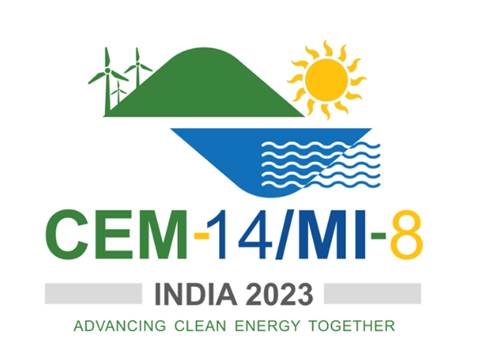
Clean Energy Ministerial
The Clean Energy Ministerial (CEM) brings together a community of the world’s largest and leading countries, companies and international experts to achieve one mission – accelerate clean energy transitions. Established in 2009, the CEM is an international clean energy leadership platform, a convening platform, an action platform, and an acceleration platform. It serves as:
- A platform where its members help shape the global clean energy agenda, and advance the deployment of specific clean energy technologies and solutions.
- A bottom-up, government-led community for exchanging knowledge and insights, building networks and partnerships, and facilitating coordinated actions on clean energy.
- An implementation vehicle that helps its members to achieve specific domestic clean energy objectives.
Initiatives undertaken by the Ministerial are based on areas of common interest among participating governments and other stakeholders. The Framework for the Clean Energy Ministerial, reaffirmed at the twelfth Clean Energy Ministerial in 2021, defines the CEM governance structure and outlines the mission statement, objectives, membership, and guiding principles.
India hosted the 4th Clean Energy Ministerial (CEM-4) in 2013. Through its leadership of the CEM’s Global Lighting Challenge campaign, which was inspired by India’s Unnat Jyoti by Affordable LEDs for All (UJALA) program, India helped many other governments and industry partners to achieve a global collective target of 10 billion LEDs globally. This effort was coordinated by the Bureau of Energy Efficiency on behalf of the Government of India.
The CEM has 29 members: the European Commission and 28 governments (largely aligned with the G20 membership) namely Australia, Brazil, Canada, Chile, China, Denmark, Finland, France, Germany, India, Indonesia, Italy, Japan, Korea, Mexico, Netherlands, New Zealand, Norway, Poland, Portugal, Russia, Saudi Arabia, South Africa, Spain, Sweden, the United Arab Emirates, the United Kingdom and the United States.
Mission Innovation
Mission Innovation (MI) is a Ministerial-level global forum of 23 Countries and the European Commission (on behalf of the European Union) to accelerate Clean Energy revolution and progress towards the Paris Agreement goals and pathways to Net Zero. The main objective of MI is to catalyse a decade of action and investment in research, development and demonstration to make clean energy affordable, attractive and accessible for all. It does this by taking steps to accelerate clean energy innovation to mobilise low-cost finance by international partners, enhance private sector investments and demand for clean technologies that advances R&D of clean energy technology.
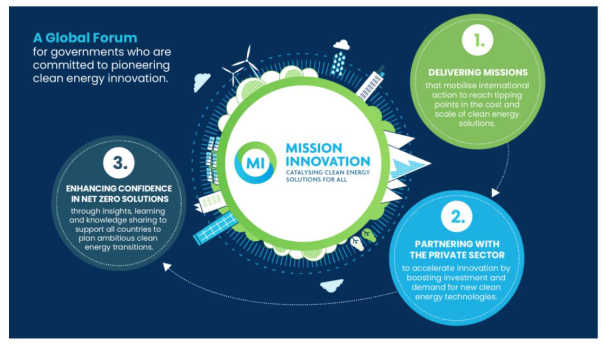
The first phase of Mission Innovation (MI) (2015-2020) was announced at COP21 on November 30, 2015, as world leaders came together in Paris to commit the ambitious efforts to combat climate change. As part of the launch statement, all the member countries committed to double Government funding on clean energy research, development and demonstration (RD&D) over 5 years and enhance international and private sector engagement, cooperation and investments in programmes on clean energy RD&D. After a successful 5 years’ stint of first phase and recognising the vital need for clean energy investment to accelerate innovation, the second phase of Mission Innovation (MI2.0) was launched on June 2, 2021. The focus of MI2.0 is on decade of action (2021-2030) and the emphasis is to scale-up the deployment of innovative clean energy technology and make clean energy affordable, attractive and accessible for all. This will accelerate progress towards the Paris Agreement goals and pathways to net zero.
Both CEM and MI aim to share lessons learned and best practices to facilitate the transition to a global clean energy economy. They do so through a combination of an Annual Ministerial meeting featuring plenaries, side-events and high-level roundtables, and year-round technical work in the form of initiatives and campaigns within CEM and missions within MI, that deliver collective actions.
***





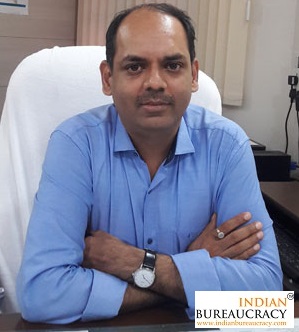
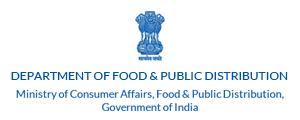
Leave a Reply
You must be logged in to post a comment.